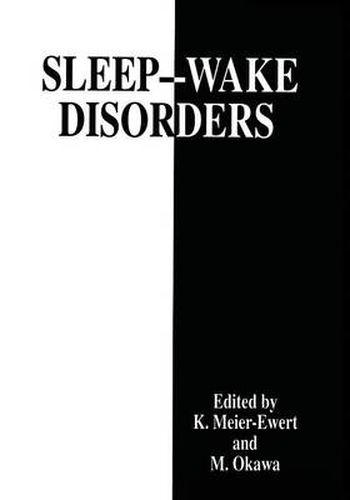Readings Newsletter
Become a Readings Member to make your shopping experience even easier.
Sign in or sign up for free!
You’re not far away from qualifying for FREE standard shipping within Australia
You’ve qualified for FREE standard shipping within Australia
The cart is loading…






This title is printed to order. This book may have been self-published. If so, we cannot guarantee the quality of the content. In the main most books will have gone through the editing process however some may not. We therefore suggest that you be aware of this before ordering this book. If in doubt check either the author or publisher’s details as we are unable to accept any returns unless they are faulty. Please contact us if you have any questions.
Sleep-wake disorders frequently give rise to severe ailments and varied distresses in a great number of people in the world, disturbing their physical and mental activities and their social function. Sleep-wake disorders are now classified into a great number of cate gories according to their clinical features and etiological factors. Patients with sleep-wake disorders are taken care of not only by specialists for such disorders but also by general physicians and specialists of different physical and mental disorders. In the recent years, the nature of sleep and sleep-wake disorders have been intensively studied by investiga tors belonging to different fields of science including medicine, biology, and psychology in many countries. It is very important for the progress of research that investigators work ing in the related fields in different countries meet together and exchange their findings and ideas. The Japanese-German International Symposium on Sleep-Wake Disorders was held on October 9-10th, 1996 in the old, beautiful city of Erfurt (Germany). This symposium was organized by Professor Karlheinz Meier-Ewert (Schwalmstadt, Germany) and Dr. Masako Okawa (Ichikawa, Japan), with support of the German Society of Sleep Research (President at that time, Professor J. H. Peter) and of the Japanese Society of Sleep Research (President at that time, Professor Y. Hishikawa).
$9.00 standard shipping within Australia
FREE standard shipping within Australia for orders over $100.00
Express & International shipping calculated at checkout
This title is printed to order. This book may have been self-published. If so, we cannot guarantee the quality of the content. In the main most books will have gone through the editing process however some may not. We therefore suggest that you be aware of this before ordering this book. If in doubt check either the author or publisher’s details as we are unable to accept any returns unless they are faulty. Please contact us if you have any questions.
Sleep-wake disorders frequently give rise to severe ailments and varied distresses in a great number of people in the world, disturbing their physical and mental activities and their social function. Sleep-wake disorders are now classified into a great number of cate gories according to their clinical features and etiological factors. Patients with sleep-wake disorders are taken care of not only by specialists for such disorders but also by general physicians and specialists of different physical and mental disorders. In the recent years, the nature of sleep and sleep-wake disorders have been intensively studied by investiga tors belonging to different fields of science including medicine, biology, and psychology in many countries. It is very important for the progress of research that investigators work ing in the related fields in different countries meet together and exchange their findings and ideas. The Japanese-German International Symposium on Sleep-Wake Disorders was held on October 9-10th, 1996 in the old, beautiful city of Erfurt (Germany). This symposium was organized by Professor Karlheinz Meier-Ewert (Schwalmstadt, Germany) and Dr. Masako Okawa (Ichikawa, Japan), with support of the German Society of Sleep Research (President at that time, Professor J. H. Peter) and of the Japanese Society of Sleep Research (President at that time, Professor Y. Hishikawa).